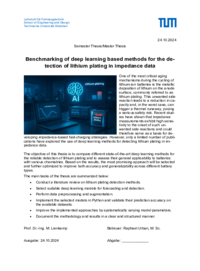Benchmarking of deep learning based methods for the detection of lithium plating in impedance data
- Institut
- Lehrstuhl für Fahrzeugtechnik
- Typ
- Semesterarbeit Masterarbeit
- Inhalt
- experimentell theoretisch
- Beschreibung
One of the most critical aging mechanisms during the cycling of lithium-ion batteries is the metallic deposition of lithium on the anode surface, commonly referred to as lithium plating. This unwanted side reaction leads to a reduction in capacity and, in the worst case, can trigger a thermal runaway, posing a serious safety risk. Recent studies have shown that impedance measurements exhibit high sensitivity to the onset of such unwanted side reactions and could therefore serve as a basis for developing impedance-based fast-charging strategies. However, only a limited number of publications have explored the use of deep learning methods for detecting lithium plating in impedance data.
The objective of this thesis is to compare different state-of-the-art deep learning methods for the reliable detection of lithium plating and to assess their general applicability to batteries with various chemistries. Based on the results, the most promising approach will be selected and further optimized to improve both accuracy and generalizability across different battery types.
The main tasks of the thesis are summarized below:
- Conduct a literature review on lithium plating detection methods.
- Select suitable deep learning models for forecasting and detection.
- Perform data preprocessing and augmentation.
- Implement the selected models in Python and validate their prediction accuracy on the available datasets.
- Improve the implemented approaches by systematically varying model parameters.
- Document the methodology and results in a clear and structured manner.
- Voraussetzungen
- Basic understanding of lithium-ion battery systems and their degradation mechanisms
- Programming skills in Python
- Initial experience with machine learning or deep learning frameworks
- Ability to work independently and systematically
- Critical assessment of the obtained results
- Verwendete Technologien
- EIS; Impedance; AI;
- Tags
- FTM Studienarbeit, FTM EV FTM EV Powertrain, FTM Urban
- Möglicher Beginn
- sofort
- Kontakt
-
Raphael Urban, M. Sc.
Raum: MW 3511
Tel.: 089 289 10332
raphael.urbantum.de - Ausschreibung
-
